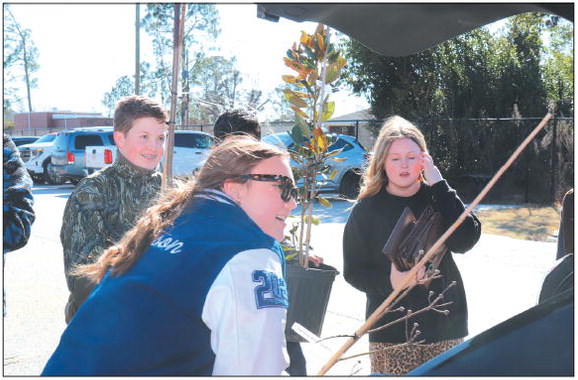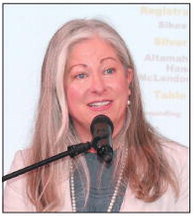Vidalia City Council Appoints Historic Preservation Commission
mrandolphadvance@gmail.com
During their regular monthly meeting on August 11, the Vidalia City Council appointed 7 individuals to serve on the newly created Historic Preservation Commission.
The creation of this Commission was first proposed during the Vidalia City Council’s meeting on Monday, June 9, as the Council completed a first reading of an ordinance to create this authority to work to maintain the city’s historic charm.
According to the ordinance, city leaders are seeking to create a Historic Preservation Commission because they recognize that the historical, cultural, and aesthetic heritage of Vidalia is one of the city’s most valued and important assets. These leaders feel that the preservation of this heritage is essential to the promotion of the health, prosperity, and general welfare of citizens within the city.
The goals of this potential Commission are to stimulate revitalization of the business districts and historic neighborhoods; to protect and enhance local historic and aesthetic attractions to tourists; to stimulate and promote business, to enhance opportunities for federal or state tax benefits under relevant provisions of federal or state law; and to establish a uniform procedure for use in providing for the protection, enhancement, perpetuation, and use of places, districts, sites, buildings, structures, objects, and landscape features having a special historical, cultural, or aesthetic interest or value. The Commission would be made up of 5 members, appointed by the mayor and approved by the city council. These members must own a business in Vidalia or work in Vidalia, and have demonstrated special interest, experience, or education in history, architecture, or the preservation of historic resources. These members may serve on other city committees or commissions, and will serve 3-year terms. No member will serve more than two terms, and initial appointments will include 1 member with a 1-year term, 2 members with 2-year terms, and 2 members with 3-year terms. These members will not be paid for their involvement with the Commission but may be reimbursed for expenses related to the Commission.
The following outlines the powers of the Commission that are were initially included in the proposed ordinance: The Commission will serve to prepare and maintain an inventory of all property within Vidalia that could be deemed as historic property, and will recommend districts, sites, buildings, structures, sites, and objects to the Vidalia City Council to be deemed as historic properties or districts. The group will also have the power to recommend properties to the Council to have their historic designation removed or revoked.
The group will then submit a list of designated historic properties and districts to the Department of Community Affairs, and will review and make comments to the Department’s Historic Preservation Division regarding the nomination of properties within its jurisdiction to be named to the National Register of Historic Places.
In addition to this, the Commission will also review applications for Certificates of Appropriateness, which document the Commission’s approval of property owners to make a material change in the appearance of a designated historic property or a property within a historic district. The changes that must be approved in this manner include any alteration that will affect the exterior architectural or environmental features of the historic property, or any building, structure, site, object, or landscape feature within a historic district. Examples of these changes are the relocation of doors and windows; removal or alteration of the architectural features or details; demolition or relocation of a historic structure, excavation for construction purposes; change in location of advertising seen from the road; erection, alteration, restoration, or removal of any buildings or structures from a historic property or district; paving; and fence or steps installation or alteration. Exterior painting will not require a Certificate of Appropriateness.
The group will have the ability to accept donations, gifts, grants, or funds of historic property, and will be able to acquire and sell property. They will work to restore or preserve any historic properties acquired by the City, and can seek local, state, federal, or private funding for the purpose of historic preservation. They will make recommendations to the Vidalia City Council for the expenditures of these funds, and the Council will vote on these purchases.
The Commission will promote the acquisition of façade and conservation easements by the city, which seek to protect historic structures and spaces. They will also investigate and study matters related to historic preservation, and will consult with historic preservation experts when the Council or Commission deems its necessary or appropriate. The group will also participate in private, state, and federal historic preservation programs. The Council will authorize the agreement for these programs.
The group will conduct educational programs on historic properties located within the city and on general historic preservation activities, which they will host throughout the city.
The Council hosted a public forum on Thursday, June 26, to hear citizens’ concerns and comments about the new ordinance.
At the beginning of the public forum, City Manager Josh Beck explained to the public why the ordinance was currently being considered, and why such legislation was vital to the city’s wellbeing.
“The purpose and intent of this is that the city cherishes our downtown, cherishes different elements of our neighborhoods, and wants to try to implement something to protect those elements. This Historic Preservation Commission ordinance in one step in that direction,” he told the attendees. “We value what we have, we think that it’s important to hold onto it and be able to pass that down to the next generation.”
He went on to address several concerns that had already been shared with council members regarding the group’s power and the areas that could potentially be deemed as historic districts or properties. “This Commission has no authority unless there are districts formed underneath them,” Beck said, as he stated that the first task for the Commission would be inventorying the city and determining what could be future historic properties or districts. “There really is no authority of the Board until that happens.”
Beck continued, as he shared that the city’s current priority in forming the Commission is to protect the current Downtown Vidalia Historic District. Vidalia Convention and Visitors Bureau Executive Director Alexa Britton also spoke on this, as she explained that when Downtown Vidalia had been made into a historic district, the Pal Theatre was not included in this district because of its lack of historic appearance at the time. Britton shared that this Commission could redefine historic districts and help to protect in cases like this.
City Attorney Daniel O’Connor also discussed concerns which he had heard from citizens prior to the hearing about the need for approval when renovating their properties. “You would only be required to get a certificate of appropriateness – which mainly deals with the exterior of your property – if your property is designated as historic or if you live in a designated historic district,” he clarified. O’Connor told the citizens that before any property or area could be designated as being under these guidelines, the Commission would have to inform property owners of the intent to make this designation, and owners would have the chance to comment and speak directly to the City Council regarding the issue.
Citizen and Construction Expert Harry Moses told the Council that he worried about the guidelines for demolition of structures within historic districts, as he felt they were too strict. He also shared that the allotted time for approval of a certificate of appropriateness was far too long, and could be debilitating to projects within the city.
Resident Harold Nipper shared with the Council his strong disapproval of the Commission, as he explained that prior to buying property in Vidalia, he had researched the area to see if there would be any guidelines from a Homeowners Association or Historic Preservation Commission in attempt to avoid the issue. He told the Council that the Commission’s rules infringed on citizen’s freedoms and shared his hope that they would strongly consider rejecting the new ordinance.
Citizen Kelly Tippett informed the Council that she had experience working in historic districts and areas and had been researching other comparable cities’ historic societies. She suggested providing further guidelines about who could serve on the Commission to avoid having people who serve on multiple boards or authorities continue to make decisions regarding the public.
She also told the Council to consider reviewing other cities’ historic societies and commissions to see if there is any details which they should include in the new ordinance. She stated that one area which she would like to see reviewed is the maximum $1,000 per week fine which the Commission can place on individuals who do not abide by the rules of a designated historic areas, as this could be a steep price for those who cannot quickly mitigate an issue.
The Council reviewed the concerns and made several updates to the ordinance before approving it on Monday, July 14. These updates include: The addition of a specific statement about Commission members’ conflicts
of interest The addition of a guideline that when the designation ordinance is adopted for an area, the tax parcel number will be included in the ordinance The addition of guidelines that create an easier path for a property owner to get permission to demolish a building or structure if the owner can show that the cost of repair exceeds the value of the property The revision of the allotted time that the Commission has to approve a certificate of appropriateness (shortened from 45 days to 14 days) The modification of penalty fees for not maintaining a historic structure to $1,000 per month, and the specification that each month is a separate violation of the ordinance.
During the meeting on August 11, Councilmembers selected five individuals to serve on the Board for their first term and two exofficio members. Those selected were Gray Meredith (one-year term), Catherine Craig (two-year term), Ann Owens (two-year term), Rizza O’Connor (threeyear term), Jonathan Tillery (three-year term), Lily Turner (ex-officio member), and Cameron Asbell (ex-officio member).
These new members will now work to make a catalog of the properties within the city to determine which areas should be distinguished as being historic.






